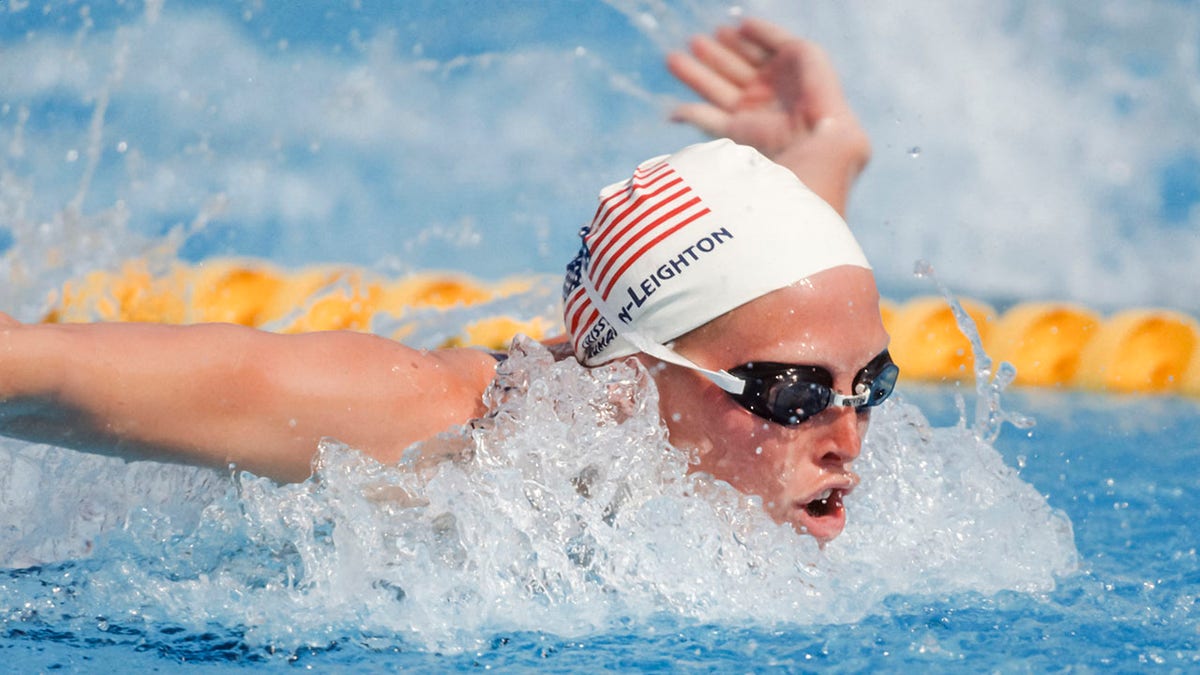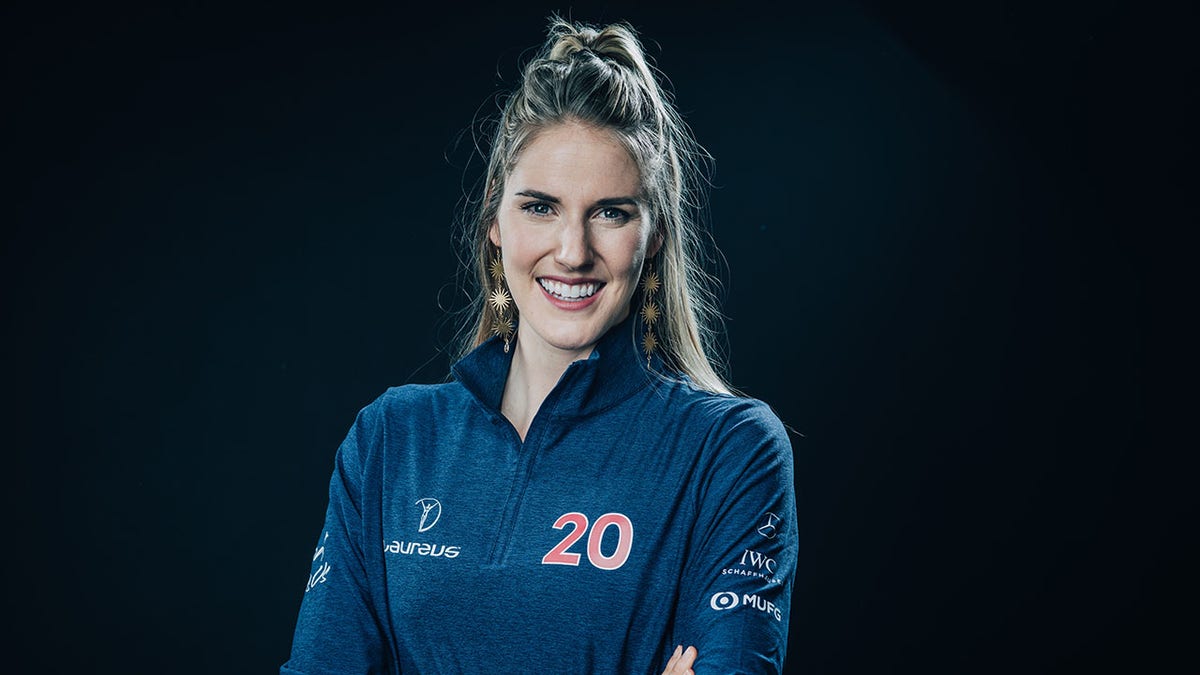Sports
Welcome to Iga's Bakery: How the world No 1 bagels her opponents

This article is part of the launch of extended tennis coverage on The Athletic, which will go beyond the baseline to bring you the biggest stories on and off the court. To follow the tennis vertical, click here.
Getting ‘bagelled’ in tennis is a humiliation.
To not win a single game suggests a mismatch, that one of the players is either out of their depth or having a terrible day on court.
Bagels — as sets that end 6-0 are known, because the zero looks like one — are seen as such an embarrassment largely because they are so rare. Twelve per cent of WTA Tour matches in 2023 included a bagel, according to data from Opta.
In just five years on tour however, world No 1 Iga Swiatek has shattered this orthodoxy.
During 2023, Swiatek won a bagel set in 29 per cent of her matches. That’s almost one in three. Her total of 23 bagels for the year was 15 higher than the players with the second-most on the women’s tour — Coco Gauff and Jessica Pegula, both with eight. Excluding matches Swiatek played in, the average for the WTA Tour last year was a bagel set in just 11.4 per cent of matches, according to Opta.
For Swiatek’s WTA career as a whole, an average of 40.6 per cent of her matches have included either a 6-0 set or a 6-1.
Swiatek is ruthless in running over opponents (Dan Istitene/Getty Images)
That’s a bagel or breadstick in close to half of her tour matches — you can see why the term “Iga’s Bakery” has entered tennis parlance.
Heading into the looming French Open, where Swiatek is a three-time champion and winner of the past two tournaments, she shows no signs of slowing down. In 2024, Swiatek has won the most bagel sets (eight) of anyone on the WTA Tour, ahead of Gauff (seven) and Aryna Sabalenka (five).
In her last two events — winning the title in Madrid and also in Rome — Swiatek has dished out three bagel sets. And as The Athletic showed last month, her number of bagels per week while world No 1 stacks up against the greats — bettered only by 18-time Grand Slam champion Chris Evert.
But how does she do it? Using data from Hawk-Eye and speaking to the players who have to face her each week, including world No 3 Gauff, world No 4 and Wimbledon champion Elena Rybakina, and Grand Slam winners including Victoria Azarenka and Marketa Vondrousova, here are the staple ingredients at Iga’s Bakery.

GO DEEPER
Iga Swiatek’s 100 weeks as world No 1: The streak, the slams, the bagels
To regularly win bagel sets, you have to be solid in all areas, particularly in returning well enough that every game is about who is the better tennis player, rather than the better server.
Swiatek is a master of this, and that’s why she is so good at running away with sets.
“She doesn’t have any holes in her game,” says world No 11 Daria Kasatkina, who has lost in straight sets the last five times she’s played Swiatek. These include a 6-3, 6-0 defeat in Doha, Qatar two years ago.
“In tennis in general, that’s very important. She returns very well, and though sometimes she can have some troubles on serve, generally she’s very stable in all aspects. She can switch from defence to attack very quickly. So for me, this is one of her weapons. And mentally, she is very strong.”

Swiatek has 21 titles at 22, including four Grand Slams (Michael Owens/Getty Images)
Vondrousova, the world No 6 and reigning Wimbledon champion, has played Swiatek three times and is yet to win a set, suffering a bagel and two breadsticks. “If she’s on fire, there’s not much you can do. She doesn’t have a worse side to try and hit,” Vondrousova says.
Having accumulated over 100 weeks as world No 1, Swiatek’s base level is clearly outstanding — even in sets she doesn’t win to love or one. But is there anything she does especially differently when running away with it?
Using Hawk-Eye data, The Athletic has sorted Swiatek’s sets played into bagels and those that were 6-2 or closer.
In her bagel sets, Swiatek produces more unreturned serves: 31 per cent compared to 27 per cent. Her service games get quicker by 17 seconds on average as a result; her return games, meanwhile, speed up by 16 seconds.
This supports what the eye-test says. Watching Swiatek put another bagel in the oven, it feels that things are spiralling quickly out of control for her opponent. This is demonstrated by the average length of return games, which are three minutes and 18 seconds if it’s game one of a bagel set; four minutes and 48 seconds if it’s the third game; and three minutes and three seconds if it’s the sixth.
By this point, whoever Swiatek is playing is seemingly thinking, ‘Please, make it stop’, and is almost happy to get off the court. By the sixth game of a bagel set, Swiatek hits her returns four miles per hour faster on average than in game one — reflecting a higher level of aggression as she motors towards the finishing line.
Overall, Swiatek returns far better in sets she wins 6-0 than in the ones that are 6-2 or closer. She returns 88 per cent of first serves and 92 per cent of second serves in the former, compared to 79 per cent and 84 per cent in the latter.

Swiatek is a master of playing with a lead (Clive Brunskill/Getty Images)
As well as getting more balls in play, she returns more aggressively in bagel sets. Her first-serve return hit point is closer to the baseline (12.2m from the net compared to 12.4m) and her first-serve return net clearance is lower (87cm compared to 92cm).
These are small numbers in isolation, but put together they add up to Swiatek strangling her opponents’ game.
“I felt like her depth was so good from the first ball,” world No 16 Madison Keys, who in the past few weeks has lost 6-1, 6-3 to Switaek in both Madrid and Rome, says of that first meeting. “She makes you feel like you can never get your foot on the gas. And then, all of a sudden, you’re the one backing up off the baseline, and that’s not a scenario you want to find yourself in. You don’t want to be behind the baseline trying to run.
“She puts you in a tricky position because you feel like you have to go for something you don’t want to and then you’re threading the needle between going for something that could be dumb but also feeling like it’s kind of the only thing you can do.”
Players don’t just struggle to stay with her — she takes matches away from them.
When Swiatek is rolling, she gets more clinical.

Facing Swiatek on a roll can be a disorienting experience (Julian Finney/Getty Images)
Break-point conversion rises to 67.9 per cent in bagel sets from 54.7 in closer ones, and she wins 31.5 per cent of converted break points with a winner, compared to 26.1 per cent. In general, Swiatek’s winners as a proportion of her points won go up in bagel sets (from 26.1 per cent to 28.9), as do points won from forced errors (17.2 per cent up to 18.5 per cent).
As Keys explained, a lot of those forced errors come from players feeling like they have to go for more than they are really comfortable with.
What is striking about all these data points is that Swiatek’s groundstrokes don’t change all that much.
Her average forehand speed is the same (75mph), as is her average backhand speed (70mph). The spin rate is a bit higher during bagel sets on both the forehand (2476rpm compared to 2416) and on the backhand side (1965rpm compared to 1901), but not by much. Her average net clearance is similar on both wings as well.
This suggests that the sequences where Swiatek rolls through games are as much about momentum and flow as they are technique. The dominance becomes self-fulfilling once she wins a few games, and she and her opponent both feel like they know what’s coming next, so the starts and ends of points become more inevitable; what happens in between is less important.
Additionally, Swiatek is not a player who eases into tournaments — she often racks up thumping wins early on, which although they are theoretically against weaker opponents, still send out a message to her rivals and make her even more ominous as she moves through a draw.

Swiatek’s remodelled serve has made her even more of a threat (Tim Clayton/Corbis via Getty Images)
One of Swiatek’s predecessors as world No 1, Naomi Osaka, who lost 6-4, 6-0 when the pair last met two years ago, says it’s “incredible” how Swiatek can keep delivering point after point, week after week: “It’s something that I honestly can’t fathom from back when I was No 1 for like five seconds.”
“It’s her ability to play one point at a time that puts a lot of pressure on her opponents,” says two-time Australian Open champion Azarenka, who has lost 6-4, 6-0 and 6-4, 6-1 to Swiatek in their two most recent meetings. “Not many people can figure it out.”
Keys, who has beaten Swiatek previously but has also suffered a 6-1, 6-0 defeat on top of those recent losses, agrees: “Her intensity is basically unmatched by anyone else. She’s on you every single point.”
Sofia Kenin, the 2020 Australian Open champion who was beaten 6-4, 6-1 by Swiatek in that year’s French Open final, describes her as “super intense”. During that run at Roland Garros four years ago, Swiatek won a breadstick set in six of her seven matches.

Swiatek’s win over Kenin was her first Grand Slam title (Martin Bureau/AFP via Getty Images)
This psychological torture doesn’t stop when they get off the court.
Swiatek’s opponents — and would-be opponents as draws unfold — find themselves in a vicious cycle: the more bagel sets she wins, the more they fear them, and the more likely they become.
Players are actively having to try to block out this reputation she has when preparing to face her.
“I think if you start thinking, ‘Ah, maybe I’m gonna get a 6-0 from Iga’, then you’ll probably end up getting one,” three-time Grand Slam finalist Ons Jabeur, who lost the pair’s most recent meeting 6-1, 6-2, told The Athletic this week. “Getting that kind of karma.
“Not thinking like that is the most important thing. She’s such an amazing player, but you should always think about yourself and not get into that mindset.”

Swiatek’s relentlessness creates an aura that her opponents sometimes struggle to handle (Sarah Stier/Getty Images)
This is easier said than done.
Her opponents have a hard enough time managing their mental state before accounting for the fact that Swiatek is a master of diagnosing it from the other end of the court, feeding off it, and taking their mind as much as their body. She is an elite problem solver, having been a gifted mathematician at school; once she has figured a player out, there is very little they can do.
Gauff, who has lost 10 of her 11 meetings with Swiatek (including 6-1, 6-3 in the French Open final two years ago) and has been bagelled by her three times, agrees: “When you’re playing her, you shouldn’t worry about the results in the previous matches, because every day is a new match and a new opportunity. I think if you play her thinking about her results, then you probably (already) lost the match.
“I just approach every match as a clean slate. I think it’s even more important when you’re playing against somebody who has done well in the past, just because you don’t want that to affect how you play.”
How hard is that to do?
“For me, not that hard,” Gauff says, “just because I feel like in the past, with the way my career has gone, I played a lot of big names early. I think I just got used to separating the name from, I guess, the match. So for me, it’s not that difficult. Obviously, playing Iga herself is difficult. But I guess that aspect doesn’t affect me when I’m playing her.”
Rybakina, who has a 4-2 winning record against Swiatek, says it’s about being focused for every single point: “You have to constantly be saying to yourself what you have to do.”
To try to crack the code though, we turn to Jelena Ostapenko — the all-or-nothing Latvian who has an astonishing 4-0 winning record against Swiatek. How does she not only avoid getting bagelled by Swiatek, but actually find a way to beat her every time?
“That’s my top secret,” Ostapenko replies, with a grin. “I’m not going to say anything.”
OK, but how hard is it to live with her when she gets going? “That’s my secret,” she repeats.
Time to put the bagel slicer away.
And even if Ostapenko did reveal her secrets, knowing what to do to stop Swiatek is one thing; pulling it off under pressure is quite another.
As tennis turns to Paris for this year’s French Open, Iga’s Bakery arrives in the viennoiserie capital of the world very much open for business.
(Top photos: Patrick Smith; Clive Brunskill/Getty Images; design: John Bradford)

Sports
Angel Reese defends hitting Caitlin Clark in head, resulting in flagrant foul: 'It's a basketball play'

The Chicago Sky-Indiana Fever rematch was a highly anticipated game Sunday afternoon with Caitlin Clark and Angel Reese pitted against each other in another chapter of their WNBA journey.
And things got a bit testy when Reese whacked Clark in the head on a block attempt in the third quarter of the Fever’s 91-83 victory, resulting in a flagrant foul.
Reese was asked about the flagrant foul by a reporter after the game, and she cut him off quickly.
Angel Reese, left, of the Chicago Sky reacts after fouling Caitlin Clark, right, of the Indiana Fever during the second half at Gainbridge Fieldhouse June 16, 2024, in Indianapolis. (Emilee Chinn/Getty Images)
“A basketball play. It was a basketball play,” Reese said. “I can’t control the refs. They affected the game obviously a lot tonight.”
Reese was adamant officials were not calling the same game on both ends of the floor. The Sky were called for 21 personal fouls as a team, while the Fever were whistled for 17. Reese and fellow rookie Kamilla Cardoso each had five fouls.
VIEW THE REESE BLOCK ATTEMPT ON X
“I think we went up really strong a lot of times, and we didn’t get a lot of calls,” Reese explained when asked about her and Cardoso’s performances. “Going back and looking at the film, I’ve seen a lot of calls that weren’t made. I guess some people got a special whistle. But just being able to play hard as best as we can.”
CAITLIN CLARK UNBOTHERED BY PEOPLE USING HER NAME IN CULTURE WARS: ‘BASKETBALL’S MY JOB’
It’s unclear who Reese was referring to when talking about the “special whistle.”
As for Clark’s thoughts on the flagrant foul, she didn’t have anything bad to say about Reese. She agreed the physicality wasn’t anything malicious.

Caitlin Clark, left, of the Indiana Fever drives to the basket against Marina Mabrey, right, of the Chicago Sky during the first half at Gainbridge Fieldhouse June 16, 2024, in Indianapolis. (Emilee Chinn/Getty Images)
“What’s going through my mind is, ‘I need to make these two free throws,’” Clark said when a reporter asked her thoughts immediately after the foul. “That’s all I’m thinking about. Just a part of basketball. It is what it is. Just trying to make a play on the ball and get the block. It happens.”
Clark continued by lauding Reese’s competitive spirit and using her platform to promote the game.
“I think it’s just the emotion and passion we play with,” Clark said. “I think people love to see that, and I think that’s maybe not something that was always appreciated in women’s sports. And it should be. That’s what makes it fun. We’re competitors. That’s the way the game should be. It’s going to get feisty, it’s going to get physical. But, at the end of the day, both of us are trying to win.
“I think what she’s done with her platform has been absolutely incredible, and she has an entire fan base that’s supported her for what she did at Maryland and LSU. Obviously, I played her a very long time, and she’s been a tremendous player. So, it’s getting to compete against [her], and I think it’s been really good for the game. And people love to see great matchups.
“But, also, at the same time, people tune in for these matchups, but then they get to see how amazing these teams are, and they find new players to support. And continue to come back for them, too. So, I think that’s another benefit of it, honestly.”

Angel Reese defended her block attempt on Caitlin Clark, which resulted in a flagrant foul. (Getty Images)
Fever head coach Christie Sides also believed the “right call was made” by officials on the Reese flagrant. She also alluded to flagrant fouls not being called, which we’ve seen recently with the Chennedy Carter shove on Clark. It was later upgraded to a flagrant foul. But during their previous matchup, it was a common foul.
“I was really proud of how they all kept their composure,” Sides said. “The right call was made in that moment — flagrant-1, two free throws and the ball. Just make the right call in those moments, and we can move forward. When we don’t make the right call in those moments, that’s when there’s a problem.
“They made the right call tonight.”
Follow Fox News Digital’s sports coverage on X, and subscribe to the Fox News Sports Huddle newsletter.
Sports
Dodgers put Yoshinobu Yamamoto on 15-day injured list because of triceps tightness

Yoshinobu Yamamoto was put on the 15-day injured list Sunday because of triceps tightness, an injury that forced the Dodgers right-hander out of Saturday night’s 7-2 loss to the Kansas City Royals after two scoreless innings.
Yamamoto was undergoing further medical testing Sunday, the results of which were not immediately available. The hope among the Dodgers is that the injury isn’t serious, but Houston Astros pitcher Justin Verlander experienced similar triceps tightness before undergoing Tommy John surgery in 2020.
“Right now, as I sit here, no, I don’t think so,” manager Dave Roberts, speaking before Sunday’s series finale against the Kansas City Royals, said when asked if the injury could be a precursor to something more serious.
“And I think that he was smart enough to notify us when there was some tightness in his triceps. We’ll know more with the testing and him talking to the doctors, but I don’t think so. I really don’t.”
Yamamoto gave up only one hit Saturday night, but there was a noticeable dip in the velocity of the 28 pitches he threw. His four-seam fastball ranged from 92.9 mph and 95.9 mph with an average of 94.2 mph, down 1.3 mph from his season average of 95.5 mph entering the game.
Yamamoto threw 29 pitches that were clocked at 97 mph or higher in his previous start in which he blanked the New York Yankees on two hits over seven innings on June 7. The velocity of his secondary pitches were also down Saturday, his curve by 2.4 mph and his split-fingered fastball by 2.9 mph.
“The most important time of the season is yet to come, and his health is paramount,” Roberts said. “So for us to be proactive and put him on the IL, kind of reset him, seems like the smartest thing to do.”
Yamamoto, whose durability and dominance during his seven years in Japan were two of the reasons the Dodgers signed the 25-year-old to a 12-year, $325-million deal in December, said through his interpreter that he began feeling tightness in his triceps last week, as he was recovering from his Yankee Stadium gem.
“That was the reason” his scheduled Thursday night start against the Texas Rangers was pushed back to Saturday night against the Royals, Yamamoto said.
Yamamoto completed his between-starts workout in the bullpen Thursday and said he was not experiencing any triceps tightness on Saturday. The discomfort flared up during pregame warmups, but Yamamoto said “it was not that serious at that point. … Then, as I was pitching [in the game], it started [to get worse].”
There was some confusion after the game, with Yamamoto telling reporters that he informed pitching coaches Mark Prior and Connor McGuiness that he felt some discomfort while warming up and Roberts saying that he “didn’t know until the second inning that [Yamamoto] couldn’t go back out there for the third inning.”
Roberts said he gained some clarity on the situation later Saturday night.
“I did talk to Mark, and the conversation [with Yamamoto] was, ‘How do you feel?’” Roberts said. “And [Yamamoto said], ‘I don’t feel 100%. I don’t feel frisky, but I feel fine.’
“There are many conversations that happen every day in the big leagues with the pitching coach, where you’re not going to expect to feel frisky every start and you get through it. So again, that’s the communication that was relayed to me. … I still stand by the fact that I wouldn’t put a guy out there in harm’s way. I’ve never done it.”
Though the Dodgers will be losing one of their best pitchers for at least two weeks, one who is 6-2 with a 2.92 ERA in 14 starts and has struck out 84 batters and walked only 17 in 74 innings, Yamamoto’s injury won’t leave a gaping hole in the rotation.
That’s because Bobby Miller is scheduled to return from a two-month absence because of shoulder inflammation to start Wednesday night’s game at Colorado, eliminating the need for the Dodgers to employ a six-man rotation. The Dodgers also expect erstwhile ace Clayton Kershaw to return from shoulder surgery in mid-July.
“Part of constructing the roster is getting an abundance of starting pitching,” Roberts said. “Everywhere in baseball, guys go down at different times, and you’ve got to be able to backfill. To know we’re getting Bobby back and Clayton is starting a rehab assignment [this week] is certainly helpful.”
Yamamoto wasn’t the only Dodgers right-hander to be sidelined. Reliever Michael Grove was put on the 15-day IL because of a right intercostal muscle strain, an injury that is not expected to sideline the right-hander for more than a few weeks.
To replace Yamamoto and Grove on the roster, the Dodgers recalled relievers J.P. Feyereisen and Michael Peterson, both 31-year-old right-handers, from triple-A Oklahoma City.
Peterson, whose fastball touches 98 mph, had a 1.31 ERA and 31 strikeouts in 22 ⅓ innings of 23 triple-A games. Originally drafted by the Milwaukee Brewers in the 17th round in 2015, Peterson has yet to pitch in the big leagues.
Royals rally for win
Saturday night’s game turned on an epic 12-pitch battle in the top of the sixth inning between Dodgers reliever Blake Treinen and Royals left fielder MJ Melendez, who fouled off six two-strike pitches and took a ball to work the count full.
Melendez then drove the 12th pitch of the at-bat over the wall in right field for a grand slam that turned a 2-1 deficit into a 5-2 Kansas City lead.
The Dodgers had taken a 2-1 lead in the fourth inning when Gavin Lux grounded a bases-loaded, two-out, two-run single to center field.
Dodgers right-hander Yohan Ramirez retired the side in order in the fifth, and Treinen, who returned from a shoulder injury to open his season with 14 scoreless appearances in which he struck out 19 and walked only two in 13 innings, took over in the sixth.
The veteran right-hander got Bobby Witt Jr. to fly out to the warning track in left for the first out but uncharacteristically walked the next three batters, prompting a visit from Roberts.
Treinen struck out pinch-hitter Adam Frazier with a wicked 83-mph slider, but he could not retire the stubborn Melendez, who boosted Treinen’s ERA from 0.00 to 2.63 with his game-turning slam.
Treinen didn’t have usual command of his slider, so nine of the pitches he threw to Melendez were cut-fastballs.
“The cutter was probably the pitch I had the most feel for tonight, but it also handcuffed me because I can’t keep throwing the same pitch over and over again to anybody in this league,” Treinen said.
“The biggest thing was just the walks. When I walk people, they make you pay. You can live with solo shots, you can live with a couple knocks, but when you give up three bases, it’s a frustrating one from that perspective.”
Sports
Olympic gold medalist Missy Franklin discusses raising awareness for kidney health after father's transplant

As a two-time Olympian and six-time medalist, American swimmer Missy Franklin has built a large community over the years. That community has stood faithfully by her side throughout her storied career.
Perhaps it’s even more meaningful that the same community that cheered her on along the path to victory also played a crucial role in helping Franklin during a time of crisis.
“My dad [Dick Franklin] was diagnosed with ADPKD (autosomal dominant polycystic kidney disease). It runs on my father’s side of the family. It is a hereditary disease, meaning it is passed down,” Franklin told Fox News Digital in a recent interview.
Laureus World Sportswoman of the Year nominee and swimmer Missy Franklin and parents Dick Franklin and D.A Frankiln attend the 2014 Laureus World Sports Awards at the Istana Budaya Theatre March 26, 2014, in Kuala Lumpur, Malaysia. (Gareth Cattermole/Getty Images for Laureus)
“Out of the four siblings that my dad is a part of, three of them have ADPKD. And his father had it as well. It is the most common form of PKD, which is a genetic condition that causes cysts to form on the kidneys, and it leads to a decline in kidney function, which will eventually require the need for dialysis or a transplant.”
Franklin, who retired from swimming in 2018, explained that her father’s condition was known for some time, but in 2022, the family learned the difficult news that the disease was “rapidly progressing.”
“To realize that it was progressing to the point where it was severely impacting his quality of life, and we knew that we needed to do something moving forward, that pushed us to reach out to our close community about finding a living organ donor.”
In May of that year, Franklin and her family received a life-changing phone call. Her father had a donor match, and several months later, in August 2022, the transplant was performed.
OLYMPIC GOLD MEDALIST KATIE LEDECKY IS AN ‘INCREDIBLE LEADER FOR TEAM USA,’ SWIM LEGEND MISSY FRANKLIN SAYS
“Through our entire story and journey, we have just really realized the importance of having family health history conversations with genetic diseases that run in the family. And our story has a happy ending, and I am so grateful for that. And I don’t take advantage of that for one day.”
But it was that community that Franklin was already so proud to be a part of that answered her family’s call.

Crissy Ahmann-Leighton of the U.S. swims in the qualifying heats of the women’s 100-meter butterfly race during the 1992 Summer Olympics July 12, 1992, at the Bernat Picornell Pools in Montjuic, Spain. Ahmann-Leighton was the eventual silver medalist. (David Madison/Getty Images)
It was two-time Olympic gold medalist Crissy Perham who answered the call to be a living donor, and the two were miraculously a match.
“The fact that we got to match at all, the fact that my dad got a living donor at all, is such a miracle and such a gift. … And then the fact that she was an Olympic gold medalist in swimming, it’s just like – it’s so unreal,” Franklin said.
Franklin says she still remains in contact with Perham regularly and considers her a part of her family.
“There’s not a minute that I spend with my dad that I don’t think of Crissy because I literally would not have had that time and those moments with him if it were not for her and what she did for us.”
Franklin is using her platform and teaming up with Otsuka America Pharmaceutical Inc. to drive the conversation about kidney health and the importance of early detection and genetic testing.

Laureus Academy ember Missy Franklin poses at the Mercedes-Benz Building prior to the 2020 Laureus World Sports Awards Feb. 16, 2020, in Berlin, Germany. (Simon Hofmann/Getty Images for Laureus)
“I think one thing that Otsuka and I are really trying to do is, first of all, validate that these conversations are very hard to have,” Franklin said.
“It’s really hard to talk about diseases that do impact the family, that are genetic, that are passed down. But we know the importance of early detection. We know the importance of working with your health care team professionals to put together a plan in place that’s going to give you the best outcome it possibly can. And that’s why these conversations are so, so important.”
Follow Fox News Digital’s sports coverage on X, and subscribe to the Fox News Sports Huddle newsletter.
-

 News1 week ago
News1 week agoIsrael used a U.S.-made bomb in a deadly U.N. school strike in Gaza
-

 World1 week ago
World1 week agoRussia-Ukraine war: List of key events, day 833
-

 Politics1 week ago
Politics1 week agoGeorge Clooney called White House to complain about Biden’s criticism of ICC and defend wife’s work: report
-

 Politics1 week ago
Politics1 week agoNewson, Dem leaders try to negotiate Prop 47 reform off California ballots, as GOP wants to let voters decide
-

 World1 week ago
World1 week agoDozens killed near Sudan’s capital as UN warns of soaring displacement
-

 World1 week ago
World1 week agoVideo: U.S. Official Responds to Israeli Strike on a U.N. School in Gaza
-

 World1 week ago
World1 week ago‘Bloody policies’: Bodies of 11 refugees and migrants recovered off Libya
-

 Politics1 week ago
Politics1 week agoEmbattled Biden border order loaded with loopholes 'to drive a truck through': critics




















